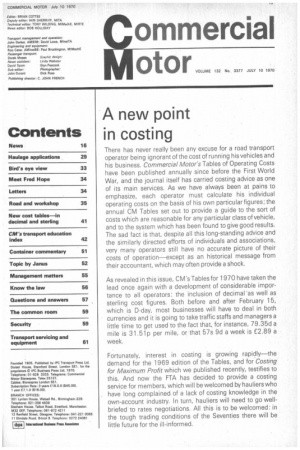A new point in costing
Page 17

If you've noticed an error in this article please click here to report it so we can fix it.
There has never really been any excuse for a road transport operator being ignorant of the cost of running his vehicles and his business. Commercial Motor's Tables of Operating Costs have been published annually since before the First World War, and the journal itself has carried costing advice as one of its main services. As we have always been at pains to emphasize, each operator must calculate his individual operating costs on the basis of his own particular figures; the annual CM Tables set out to provide a guide to the sort of costs which are reasonable for any particular class of vehicle, and to the system which has been found to give good results. The sad fact is that, despite all this long-standing advice and the similarly directed efforts of individuals and associations, very many operators still have no accurate picture of their costs of operation—except as an historical message from their accountant, which may often provide a shock.
As revealed in this issue, CM's Tables for 1970 have taken the lead once again with a development of considerable importance to all operators: the inclusion of decimal as well as sterling cost figures. Both before and after February 15, which is D-day, most businesses will have to deal in both currencies and it is going to take traffic staffs and managers a little time to get used to the fact that, for instance, 79.35d a mile is 31.51p per mile, or that 57s 9d a week is £2.89 a week.
Fortunately, interest in costing is growing rapidly—the demand for the 1969 edition of the Tables, and for Costing for Maximum Profit which we published recently, testifies to this. And now the FTA has decided to provide a costing service for members, which will be welcomed by hauliers who have long complained of a lack of costing knowledge in the own-account industry. In turn, hauliers will need to go wellbriefed to rates negotiations. All this is to be welcomed: in the tough trading conditions of the Seventies there will be little future for the ill-informed.












































































































